The Silence Clause: How Confidentiality Laws Are Used to Undermine Parents
📑 Table of Contents
Introduction: When “Privacy” Replaces Parenting
Where Confidentiality Clauses Begin
Minor Consent Laws: What They Mean
The Age of 12: A New Legal Divide
Gender Identity and Confidentiality: A Dangerous Mix
The Role of Schools, Counselors, and Clinics
Case Studies: When Parents Are Locked Out
What the Laws Say (and What They Don’t Say)
How to Challenge Confidentiality Misuse
Conclusion: Reclaiming Trust and Transparency
🔹 Chapter 1: Introduction – When “Privacy” Replaces Parenting
You raise your child.
You feed, shelter, educate, and protect them.
But one day you find out—you no longer have a right to know what your child tells a counselor, nurse, or school staff member.
“Confidentiality,” they say.
“Privacy rights,” they claim.
And just like that, the government has driven a wedge between you and your child—using legal language to hide behind your back.
🔹 Chapter 2: Where Confidentiality Clauses Begin
Confidentiality laws were designed to:
Protect minors from abuse at home
Provide access to emergency medical/mental health care.
Offer safe spaces for sensitive disclosures (e.g., assault)
But these laws are now being weaponized:
To hide gender transitions
To bypass parental notification
To start treatment without oversight
To file CPS reports without parent input
The law didn’t change. But how schools and clinics use ID.
🔹 Chapter 3: Minor Consent Laws – What They Mean
Most states allow minors as young as 12 to:
Consent to mental health therapy
Receive contraception or STD treatment.
Begin gender-affirming care evaluation.s
Discuss suicide, gender identity, or abuse with staff without parental notification.
This means:
A counselor can talk to your child about identity, medication, or transition—without ever telling you.
Some states even allow continued services over your objection.
🔹 Chapter 4: The Age of 12 – A New Legal Divide
In many states, 12 is the legal cutoff.
At age 11, you’re the gatekeeper.
At age 12, the gate is removed.
States that allow minors to consent to mental health treatment at 12:
California
Oregon
Washington
New York
Illinois
Vermont
(and others)
At 12, a school counselor can:
Initiate sessions
Keep records hidden
Refer your child to outside clinics.
Advocate for services you would never allow
🔹 Chapter 5: Gender Identity and Confidentiality – A Dangerous Mix
Gender identity has become the #1 issue where confidentiality overrides parenting.
Here’s what’s happening:
Students are referred to school “safe spaces” for gender support
Staff create Gender Support Plans (GSPs) without informing parents.
External clinics are brought in under MOUs (memoranda of understanding)
Gender-affirming pathways begin—socially, medically, and legally.
And parents are told:
“We’re protecting their privacy.”
🔹 Chapter 6: The Role of Schools, Counselors, and Clinics
Each of these players works in a different zone:
🏫 Schools: Often cite district policy or state law when denying you access
🧠 Counselors: May operate under HIPAA if contracted, bypassing FERPA rights
🏥 Clinics: May claim full confidentiality, even when seeing your child weekly
📋 Social Workers: May label you “unsupportive” and escalate to CPS
Most troubling? You won’t know any of this unless you ask.
🔹 Chapter 7: Case Studies – When Parents Are Locked Out
🔸 Case 1: A California mom found out her 13-year-old daughter had been referred to a gender clinic by the school counselor. She was never told.
🔸 Case 2: A Washington father was blocked from seeing his child’s counseling notes, even though they were on school grounds.
🔸 Case 3: A 14-year-old in Oregon began using a different name and pronouns at school. The teacher admitted they had been doing this for months under a “confidentiality policy.”
In each case, the child was coached to hide from their parents.
🔹 Chapter 8: What the Laws Say (and What They Don’t Say)
The laws allow certain protections—but they do not require secrecy.
⚖️ Key legal facts:
FERPA gives parents access to school-based counseling records
HIPAA allows minors to access care—but does not bar parental access in all cases
Most state laws include exceptions for parental involvement.
But most staff default to secrecy—out of fear, bias, or misinformation.
🔹 Chapter 9: How to Challenge Confidentiality Misuse
You can challenge this.
✅ Use a FERPA Request to demand counseling records
✅ Ask if the provider is operating under FERPA or HIPAA
✅ Send a “Parental Rights Affirmation Letter” stating that you expect notification and involvement
✅ File OCR or state education complaints if denied access
✅ Seek legal counsel if staff conceal records or decisions
🛡️ Pro tip: Always put your requests and refusals in writing.
🔹 Chapter 10: Conclusion – Reclaiming Trust and Transparency
Confidentiality was never meant to cancel out parenting.
It was meant to protect the child, not silence the parent.
If your child is struggling, you deserve to know.
If they’re in therapy, you deserve to be part of the plan.
If decisions are being made, you deserve a seat at the table.
🧭 This book is your call to action:
Don’t be silenced. Don’t be sidelined. Don’t be afraid to ask the question:
Who decided I didn’t need to know?





